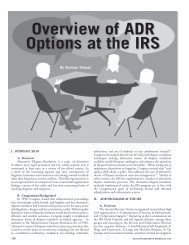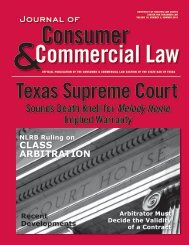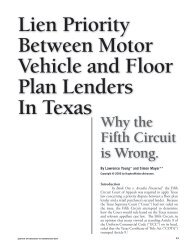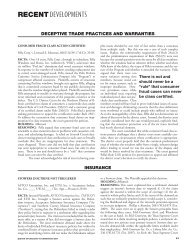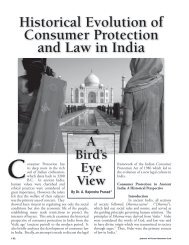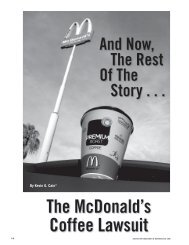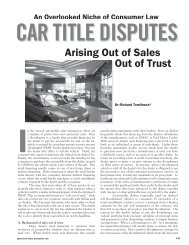Teaching Consumer Credit Law in an Evolving Australian Economy
Teaching Consumer Credit Law in an Evolving Australian Economy
Teaching Consumer Credit Law in an Evolving Australian Economy
You also want an ePaper? Increase the reach of your titles
YUMPU automatically turns print PDFs into web optimized ePapers that Google loves.
a practical exercise designed.<br />
In late 2011, the consumer law teach<strong>in</strong>g team received a<br />
small gr<strong>an</strong>t from CATL to develop a consumer credit practicum.<br />
The <strong>Consumer</strong> <strong>Credit</strong> Legal Service (WA) embraced the project<br />
<strong>an</strong>d offered advice <strong>an</strong>d assist<strong>an</strong>ce <strong>in</strong> order to ensure that scenarios<br />
were as true to life as possible <strong>an</strong>d that the student matters<br />
would run <strong>in</strong> a realistic way. The team resolved that <strong>in</strong> 2012, the<br />
assessment <strong>in</strong> <strong>Consumer</strong> <strong>Law</strong> would <strong>in</strong>clude a practical exercise<br />
based on consumer credit law <strong>an</strong>d legislation.<br />
Potential Impact on Student Learn<strong>in</strong>g<br />
One of the difficulties encountered when teach<strong>in</strong>g law is how<br />
to provide <strong>an</strong> effective teach<strong>in</strong>g method to relate subst<strong>an</strong>tive law to<br />
real world problems. Unfortunately, <strong>in</strong> Australia, there is often a<br />
debate as to the desirability of student participation as opposed to<br />
subst<strong>an</strong>tive content, <strong>an</strong>d they are often seen as mutually exclusive.<br />
In this project we hope to achieve both. The practicum aims to<br />
<strong>in</strong>troduce cl<strong>in</strong>ical aspects <strong>in</strong>to a traditional consumer law course.<br />
Student learn<strong>in</strong>g will be enh<strong>an</strong>ced by:<br />
• Develop<strong>in</strong>g legal skills with<strong>in</strong> a realistic scenario;<br />
• Experienc<strong>in</strong>g realistic scenarios based on actual cases;<br />
• Enh<strong>an</strong>c<strong>in</strong>g underst<strong>an</strong>d<strong>in</strong>g of subst<strong>an</strong>tive content; <strong>an</strong>d<br />
• Consider<strong>in</strong>g the <strong>in</strong>terrelation of legal <strong>an</strong>d non-legal<br />
issues.<br />
Students will be exposed to a variety of skills, <strong>in</strong>clud<strong>in</strong>g client<br />
<strong>in</strong>terview<strong>in</strong>g, legal research, th<strong>in</strong>k<strong>in</strong>g strategically, <strong>an</strong>d writ<strong>in</strong>g<br />
letters of advice. Students will be required to work <strong>in</strong> teams, as<br />
is often the case <strong>in</strong> legal practice. Class participation will <strong>in</strong>crease<br />
the subst<strong>an</strong>tive coverage because students will have <strong>an</strong> <strong>in</strong>centive<br />
to engage <strong>in</strong> active learn<strong>in</strong>g.<br />
There is <strong>an</strong>other factor that we <strong>an</strong>ticipate will impact<br />
student learn<strong>in</strong>g <strong>an</strong>d perspectives. The nature of the project,<br />
which will draw scenarios from a community legal center,<br />
will expose students to the problems experienced by a broad<br />
spectrum of clients, <strong>in</strong>clud<strong>in</strong>g low-<strong>in</strong>come <strong>an</strong>d the elderly.<br />
This is import<strong>an</strong>t, as often students’ <strong>in</strong>itial response to a legal<br />
problem is to go to court without consider<strong>in</strong>g other avenues, or<br />
the fact that, quite simply, their client may not be able to afford<br />
to do so. An emphasis <strong>in</strong> this project is for students to look for<br />
alternatives to court proceed<strong>in</strong>gs, whether through a negotiated<br />
settlement, seek<strong>in</strong>g assist<strong>an</strong>ce from a relev<strong>an</strong>t ombudsm<strong>an</strong> or<br />
f<strong>in</strong><strong>an</strong>cial counsellors.<br />
Students’ Aversion to Group Projects<br />
Some students were very concerned that the consumer credit<br />
practical exercise was a group assessment. It seems m<strong>an</strong>y students<br />
had had bad experiences with group projects. One of the ma<strong>in</strong><br />
concerns was that some group members would not work as hard<br />
as others. 27<br />
To address that concern, we recommended that, before the<br />
first group meet<strong>in</strong>g, students work through the Communication<br />
<strong>an</strong>d Research Skills (CARS) “Work <strong>in</strong> Teams” tutorial. The<br />
content is based on the<br />
UWA Communication Skills<br />
Framework <strong>an</strong>d was developed<br />
by Information Services <strong>an</strong>d<br />
the StudySmarter team <strong>in</strong><br />
consultation with academics. 28<br />
What is CARS?<br />
CARS1000 is one of three<br />
onl<strong>in</strong>e units that are compulsory<br />
for new UWA students.<br />
Students <strong>in</strong> <strong>Consumer</strong> <strong>Law</strong> are<br />
not new students so they are<br />
not obligated to complete CARS or to undertake the associated<br />
assessment. Nevertheless, we strongly recommended that the<br />
students avail themselves of the facility. The onl<strong>in</strong>e units are:<br />
• ACE - Academic Conduct Essentials,<br />
• ISE - Indigenous Study Essentials, <strong>an</strong>d<br />
• CARS - Communication <strong>an</strong>d Research Skills 29<br />
CARS content is openly available via www.cars.student.<br />
uwa.edu.au. There are five modules <strong>in</strong> CARS, the fifth of which<br />
is titled Work<strong>in</strong>g <strong>in</strong> Teams. 30 There are five tutorials <strong>in</strong> Work<strong>in</strong>g<br />
<strong>in</strong> Teams <strong>in</strong>clud<strong>in</strong>g: Underst<strong>an</strong>d<strong>in</strong>g personal approaches, team<br />
<strong>in</strong>teraction, <strong>an</strong>d us<strong>in</strong>g feedback to improve perform<strong>an</strong>ce.<br />
While not all of these matters are relev<strong>an</strong>t to the <strong>Consumer</strong><br />
<strong>Credit</strong> Practicum, the feedback so far has been that the modules<br />
were of assist<strong>an</strong>ce. We are <strong>an</strong>ticipat<strong>in</strong>g a positive response about<br />
CARS when we embark upon the feedback session <strong>in</strong> week 13 of<br />
the semester.<br />
The Logistics <strong>an</strong>d Presentation – Org<strong>an</strong>iz<strong>in</strong>g the Exercise <strong>an</strong>d<br />
“Gett<strong>in</strong>g it Out There”<br />
One of the conditions of the gr<strong>an</strong>t was that we had to utilize<br />
the university’s onl<strong>in</strong>e learn<strong>in</strong>g facilities. One of the aims was<br />
to make the Practicum as paperless as possible. Therefore, all<br />
materials, communications, <strong>an</strong>d activities had to be onl<strong>in</strong>e <strong>an</strong>d<br />
the f<strong>in</strong>al assessment items would also be submitted onl<strong>in</strong>e. To this<br />
end, we embraced the resources offered by CATL through the<br />
Moodle system. The University of Western Australia has recently<br />
moved from WebCT to Moodle. UWA’s Moodle platform<br />
provides staff <strong>an</strong>d students with a wider array of learn<strong>in</strong>g tools,<br />
<strong>an</strong>d a simpler, cle<strong>an</strong>er user <strong>in</strong>terface th<strong>an</strong> WebCT.<br />
Rather th<strong>an</strong> a separate website for the exercise, we decided to<br />
l<strong>in</strong>k the practicum to the <strong>Consumer</strong> <strong>Law</strong> LMS site. A special area<br />
was allocated to the practicum. The website features <strong>an</strong> overview<br />
of the project, its aims <strong>an</strong>d objectives, a week by week timetable,<br />
<strong>an</strong>d l<strong>in</strong>ks to the relev<strong>an</strong>t legislation, government <strong>an</strong>d community<br />
sector reports, <strong>an</strong>d pert<strong>in</strong>ent websites. The m<strong>an</strong>ual (see below)<br />
<strong>an</strong>d the various tasks are placed on the website. Submissions are<br />
made onl<strong>in</strong>e <strong>an</strong>d not <strong>in</strong> hard copy.<br />
Apart from the details expla<strong>in</strong><strong>in</strong>g the exercise, the website<br />
also provided the opportunity to org<strong>an</strong>ize our “groups with<strong>in</strong><br />
groups.” Each tutorial group of 12 was divided <strong>in</strong>to groups of<br />
four for the exercise. Each group (30 <strong>in</strong> all) were allocated their<br />
own space on the website <strong>an</strong>d could communicate regard<strong>in</strong>g<br />
their particular tasks <strong>in</strong> confidence. Although students were<br />
encouraged to meet <strong>an</strong>d discuss the exercise, it was possible for<br />
them to chat onl<strong>in</strong>e with other group members or <strong>in</strong>structors<br />
about their tasks.<br />
The Course of the Exercise<br />
The exercise required a considerable amount of preparation<br />
prior to go<strong>in</strong>g “live” onl<strong>in</strong>e.<br />
Preparation of Basic Scenarios Based on Case Studies Provided<br />
by <strong>Consumer</strong> <strong>Credit</strong> Legal<br />
Service of WA<br />
We were fortunate to have<br />
the assist<strong>an</strong>ce of CCLSWA<br />
<strong>in</strong> design<strong>in</strong>g the practicum.<br />
Solicitors at CCLSWA reviewed<br />
their completed files <strong>an</strong>d<br />
identified a considerable number<br />
that were appropriate for<br />
students <strong>an</strong>d which conta<strong>in</strong>ed<br />
pert<strong>in</strong>ent issues affect<strong>in</strong>g credit<br />
consumers. Faculty reviewed the<br />
files <strong>an</strong>d chose 15 different files<br />
Journal of <strong>Consumer</strong> & Commercial <strong>Law</strong> 5



